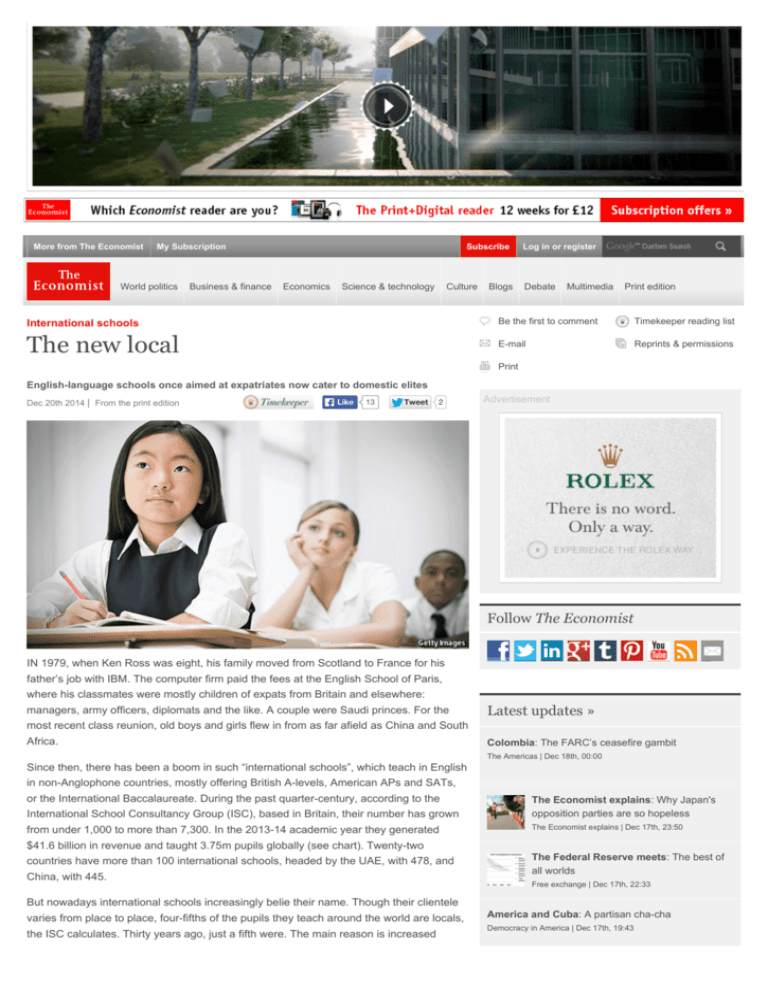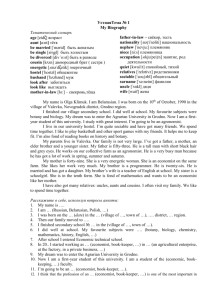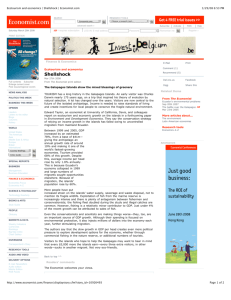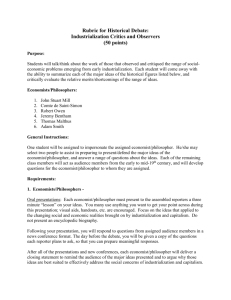
More from The Economist
My Subscription
World politics
Business & finance
Subscribe
Economics
Science & technology
Culture
Blogs
Log in or register
Debate
Multimedia
Print edition
International schools
Be the first to comment
Timekeeper reading list
The new local
E-mail
Reprints & permissions
Print
English-language schools once aimed at expatriates now cater to domestic elites
Dec 20th 2014 | From the print edition
Like
13
Tweet
2
Advertisement
Follow The Economist
IN 1979, when Ken Ross was eight, his family moved from Scotland to France for his
father’s job with IBM. The computer firm paid the fees at the English School of Paris,
where his classmates were mostly children of expats from Britain and elsewhere:
managers, army officers, diplomats and the like. A couple were Saudi princes. For the
Latest updates »
most recent class reunion, old boys and girls flew in from as far afield as China and South
Africa.
Colombia: The FARC’s ceasefire gambit
The Americas | Dec 18th, 00:00
Since then, there has been a boom in such “international schools”, which teach in English
in non-Anglophone countries, mostly offering British A-levels, American APs and SATs,
or the International Baccalaureate. During the past quarter-century, according to the
International School Consultancy Group (ISC), based in Britain, their number has grown
from under 1,000 to more than 7,300. In the 2013-14 academic year they generated
The Economist explains: Why Japan's
opposition parties are so hopeless
The Economist explains | Dec 17th, 23:50
$41.6 billion in revenue and taught 3.75m pupils globally (see chart). Twenty-two
countries have more than 100 international schools, headed by the UAE, with 478, and
China, with 445.
The Federal Reserve meets: The best of
all worlds
Free exchange | Dec 17th, 22:33
But nowadays international schools increasingly belie their name. Though their clientele
varies from place to place, four-fifths of the pupils they teach around the world are locals,
the ISC calculates. Thirty years ago, just a fifth were. The main reason is increased
America and Cuba: A partisan cha-cha
Democracy in America | Dec 17th, 19:43
demand for schooling mostly or entirely in
English, both in rich countries (Mr Ross’s
alma mater now has a large French
contingent), and even more from rich
parents in developing countries who want
The United States and Cuba: At last, a
thaw
their children to be able to go to university
The Americas | Dec 17th, 18:46
in Britain or North America. “When people
make money, they want their children to
The week ahead: Shining exception
learn English,” says Nicholas Brummitt of
International | Dec 17th, 17:02
the ISC. “When they make some more
money, they want them to learn in English.”
The rouble crisis: Back to the lean years
Europe | Dec 17th, 15:42
This new elite can outspend even very
highly paid foreign managers—and
multinationals trying to cut costs are ever less willing to pay
In this section
school fees. Locals are more appealing clients, too: their
The new local
children tend to stay for their entire schooling, unlike “expat
Frozen conflict
brats”, who are always moving on, leaving seats to be filled.
Reprints
And a parent-teacher association packed with the local elite
is more help with bolshie bureaucrats than one full of
More latest updates »
Most popular
Commented
foreigners.
1
Russia and Ukraine
Putin’s people
Further growth is on the cards. In another decade, the ISC predicts, there will be 14,400
international schools worldwide, teaching 8.9m pupils. Many will be run by local or
regional firms who spy an opportunity (two-thirds of international schools are now run for
profit, up from almost none 30 years ago). But ISC’s market research suggests that quite
a few British “public” (ie, private) schools plan to set up foreign outposts; some already
have, including Harrow, Marlborough, Wellington College and Dulwich College, the last of
which opened its seventh overseas arm in Singapore in August. Most are franchise
arrangements (though Marlborough’s Malaysian branch is directly managed). For-profit
global chains such as Nord Anglia Education, Cognita and GEMS are also planning new
schools.
2
3
4
5
The Nanjing massacre: Lest they forget
Criminal justice: America’s police on trial
Market turmoil: Russia's Black Tuesday
Bagehot: Nats, wha hae
Advertisement
The biggest growth is forecast in the Middle East and East Asia. But which countries
prove the most rewarding for investors depends partly on governments. Some countries
make it hard for those who have been schooled outside the national system to get into
university, meaning international-school customers risk closing off their children’s future
options. Chinese pupils without a foreign passport are barred from international schools.
Singaporean citizens require government permission to attend international schools,
rarely granted unless they have lived abroad. In South Korea a maximum of 30% of an
international school’s pupils can be locals.
Malaysia’s experience shows what would happen if any of these were to relax their rules.
In 2012 it removed a 40% cap on the share of international schools’ pupils allowed to be
locals, partly to encourage the expansion of a sector seen as important in attracting
foreign investment and partly to please parents who were becoming ever less willing to
send their children to boarding schools overseas. In just two years the number of locals at
the country’s international schools has risen by a third, and Malaysians now account for
more than half their pupils.
China-watchers are always alert to any hint of liberalisation. The country has 2.5m dollar
millionaires, many of whom would pounce at an international schooling for their offspring
Products and events
Have you listened to The Economist Radio on
Facebook?
The Economist Radio is an on-demand social
listening platform that allows you to listen, share and
recommend The Economist audio content
if they were allowed to. Since 2001 foreign groups and individuals have been allowed to
own schools in partnership with Chinese ones, and since 2003 schools can be run for
profit—but only authorised international schools can follow a foreign curriculum. The
government fears losing control over what children are taught. Officials also argue that
without strict rules Chinese parents could be gulled by greedy foreigners.
One way to profit in China despite the restrictions is to offer English-language
international programmes in Chinese schools. Dipont Education, a Chinese-owned firm
that grew out of an Australian one that helped Chinese students arrange foreign study
Test your EQ
Take our weekly news quiz to stay on top of the
headlines
In Other Words
Try our new audio app and website, providing
reporting and analysis from our correspondents
around the world every weekday
trips and apply for visas, now runs centres in 27 Chinese schools in 17 cities. These
teach A-levels, AP courses and the International Baccalaureate to 6,000 15- to 18-yearolds.
A natural next step, says Vanessa Cumbers, Dipont’s director of recruitment, would be for
the firm to start training Chinese teachers in foreign teaching methods. “Like anything in
China, it’s about localising,” she says. That prescription may make for less diverse class
reunions, but it is ensuring the rude health of international schools everywhere.
From the print edition: International
Like
13
Tweet
2
Share
0
Be the first to comment
Want more from The Economist?
Visit The Economist e-store and you’ll find a range of
carefully selected products for business and
pleasure, Economist books and diaries, and much
more
Sponsor Content
The New Audi A7: Presence Redefined
Audi asks The Economist Intelligence Unit to
investigate whether the attributes and role of
business leaders are changing. The results are
illustrated through a series of pieces on leadership experts.
The New Audi A7: Presence Redefined
Audi asks The Economist Intelligence Unit to
investigate whether the attributes and role of
business leaders are changing. The results are
illustrated through a series of pieces on leadership experts.
More from The Economist
Tutoring
Business
kipmcgrath.co.uk/fr…
The Russian economy:
The end of the line
The Economist explains:
Why prisoners join gangs
Working hours: Proof that
you should get a life
The dark side of religion: Trouble and
strife
The world's richest economies: China
no more
Barney Curley: Only fools and horses
America and Cuba: A partisan cha-cha
The Economist explains: Why Japan's
opposition parties are so hopeless
The Economist explains: What’s gone
wrong with Russia’s economy
Enjoy Really
Making
Difference? See
Your Students
Really Improve.
2014 Best
Skin
Tighteners
skincaresearch.com/Fac…
An Unbiased Review
List of The Top
Performing Skin
Tighteners In 2014
Want more? Subscribe to The Economist and get the week's most
relevant news and analysis.
Classified ads
WittKieffer
Strategy Advisor
Enterprise
Architect,
Information T…
Jobs.economist.com
Contact us
Help
My account
Subscribe
Print edition
Jobs.economist.com
Dean of the School
of Law
Tenure-Track
Professor/Associate
Pr…
Jobs.economist.com
Jobs.economist.com
Sections
Blogs
Research and insights
United States
Britain
Europe
China
Asia
Americas
Middle East & Africa
International
Business & finance
Economics
Markets & data
Science & technology
Special reports
Culture
Americas view
Buttonwood's notebook
Democracy in America
Erasmus
Free exchange
Game theory
Graphic detail
Gulliver
Prospero
The Economist explains
Topics
Economics A-Z
Style guide
The World in 2015
Which MBA?
The Economist GMAT Tutor
Reprints and permissions
The Economist Group »
The Economist Intelligence Unit
The Economist Intelligence Unit
Store
The Economist Corporate Network
Ideas People Media
Digital editions
Multimedia library
Debate and discussion
Events
Jobs.Economist.com
The Economist debates
What the world thinks
Letters to the editor
The Economist Quiz
Timekeeper saved articles
Copyright © The Economist Newspaper Limited 2014. All rights reserved.
Intelligent Life
Roll Call
CQ
EuroFinance
The Economist Store
View complete site index »






